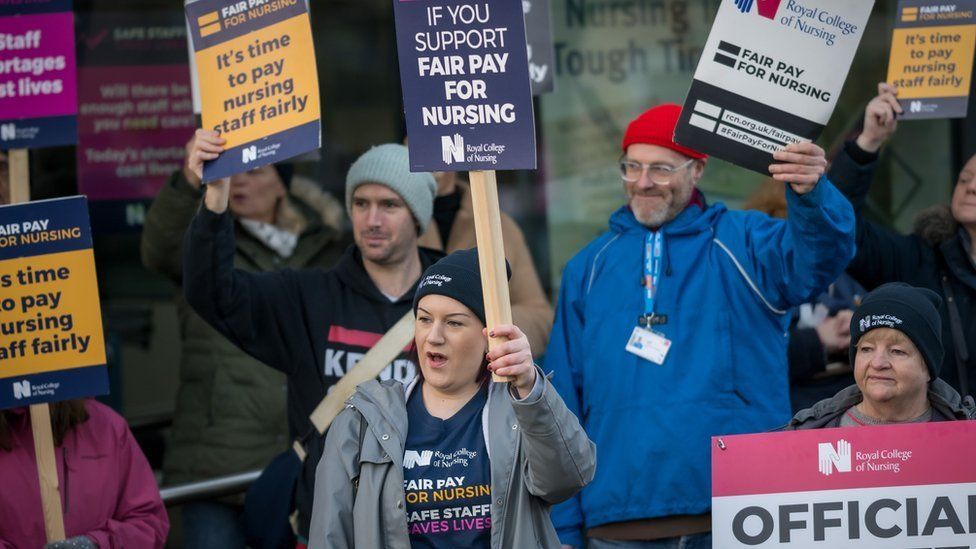ARTICLE AD BOX
 Image source, Getty Images
Image source, Getty Images
Nurses in most parts of Wales are set to strike again on 6 and 7 June
By Jenny Rees
BBC Wales health correspondent
Nurses across nearly all parts of Wales will strike for 12 hours on Tuesday and Wednesday in an ongoing dispute over pay.
The industrial action means thousands of planned care appointments will be impacted.
Aneurin Bevan health board, in south east Wales, is the only one not to be affected.
The Royal College of Nursing (RCN) Wales' chief said members needed "more commitments" from the Welsh government.
She added that the ballot for further action would reopen in July.
The Welsh government said it was "disappointed" that strike action was continuing.
Marcus Longley, a former chairman of Cwm Taf Morgannwg University Health Board, toldBBC Radio Walesthat there is a "real toxic mix" of factors that have come together, from pay, working conditions and staffing issues.
"There is a danger of salami slicing - you chop a little bit off and a little bit off - and you end up with an institution that nobody is proud of," he said.
"That is a recipe for constant crisis."
The strike is due to take place between 07:00 and 19:00 BST on both days, though there are exemptions where certain units will be staffed.
These include critical care units, dialysis and chemotherapy services, life-threatening cancer treatments, neonatal and paediatric intensive care units and standalone paediatric emergency departments.
Night duty levels of staffing will also be in place for A&E, 24-hour in-patient areas and community services.
It means elective and routine procedures involving Royal College of Nursing members - such as operations and outpatient appointments - will not take place.
The RCN in Wales has more than 17,000 members but it is not clear how many will withdraw labour during the strike.
Managers are planning around that uncertainty, which is why many clinics and procedures will not have been booked for the two days.
'Better and bigger commitments'
Helen Whyley, director of the Royal College of Nursing in Wales, said members wanted better working conditions and a further rise in pay.
"We need some more commitments from the Welsh government about things that will influence and affect nursing," she said.
"It keeps people retained, it makes them want to come into the profession. But alongside that we're also looking for better and bigger commitments about terms and conditions, recruitment and retention, things that will keep nurses working not just today or tomorrow, but for the next five, 10, 15 years.
"My members don't want to be out on picket lines, they want to be doing what they do well and that's looking after patients."
An improved pay deal for most NHS staff was recently announced by the Welsh government, but RCN members in Wales voted to reject the offer and these two days of industrial action were scheduled.
RCN Wales chief Helen Whyley says members have not taken the decision to strike lightly
The union went on strike twice in December last year, but suspended further action in February while talks with the Welsh government continued.
Their current mandate for strike action runs out on 1 August, though the RCN said it had already set plans in motion to renew that support among its membership.
Ms Whyley added that members were "not doing this lightly".
"My members don't want to be out on picket lines, they want to be doing what they do well and that's looking after patients," she said.
But she added that any solution needed to mean "they'll go to work and they won't be the only person on duty that's substantive, that they'll take their pay packets and be able to pay to feed their families and take their children out.
"And that they'll have a profession that other people want to join."
A Welsh government spokesperson said: "While we recognise the strength of feeling among members, we are disappointed that strike action is continuing despite the collective decision to accept the Agenda for Change pay offer by the Wales Partnership Forum Business Committee.
"We are working with the NHS, unions and partners to ensure life-saving and life-maintaining care is provided during the industrial action, patient safety is maintained and disruption is minimised.
"But it is vital that all of us to do all we can to minimise pressure on our health service during the industrial action and consider carefully what activities we take part in."
The Welsh Government urged people to call 999 if "in immediate danger" but to use the NHS 111 website or a local GP or pharmacy for health advice "where there is no immediate threat to life".
When nurses took to the picket lines in December, the wider mood was a little different.
They were soon followed by two other large unions representing ambulance staff. Discontent hung heavy in the air.
But six months on and a majority of unions representing healthcare workers have accepted the improved pay offer from the Welsh government - for both the current and previous financial years.
While all health workers, aside from doctors, therefore benefitted from the deal, the RCN said its members were not bound by that collective decision - and were still exercising their right to strike.

 2 years ago
60
2 years ago
60








 English (US) ·
English (US) ·